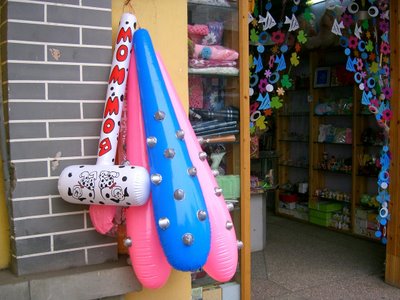The tools of Christmas Eve “traditions"
 As we prepare to leave Beibei, I would like to update two earlier reports. The University of Florida made our trip to China possible by granting me a semester of academic leave. The purpose of academic leave is to learn, and as these amendments demonstrate; learning continues.
As we prepare to leave Beibei, I would like to update two earlier reports. The University of Florida made our trip to China possible by granting me a semester of academic leave. The purpose of academic leave is to learn, and as these amendments demonstrate; learning continues.Earlier I reported that I had seen no evidence of dog as food. To the contrary, people in China seem to love their dogs as pets. As we were leaving the metropolitan city of Chengdu, the capital of Sichuan province, our bus passed a motorcycle (a common form of taxi and transport) that had the skinned, market-readu carcasses of three dogs on the back. So, though not common, dog is still a food to some folks in some regions.
Two weeks ago I commented on the sense of security we feel here. Last night, someone cut the chain of the gate into our apartment courtyard and then cut the chain on the doors into our apartment building. They went to the third floor where they found a door that had not been locked (such is the sense of security). Two cell phones and a pair of jeans were stolen. The wife of the couple in the apartment heard the intruders and her screams chased them off. This morning we had police all over the place. This afternoon a new, stronger door to the apartment building was installed. Fortunately, no one was hurt. Our views concerning security have changed.
A final note: Some manifestations of a good-old American style, commercial Christmas have appeared in Beibei. One of my students said that it is something that has happened in the past five years and that it is just an excuse for the merchants to sell more stuff. Since China is predominately non-Christian, the original meaning of Christmas is totally lost, giving rise to the need for local traditions. One “tradition” of this holiday is to gather on Christmas Eve in the city square and hit one another with inflatable plastic toy bats, swords, and hammers [see photo]. This, we are told, is an old American tradition. So, Americans, get your Chinese made bats at the local K-Mart and have a gay old time hitting one another on Christmas Eve.
Editor's note: Dr. Drummond has returned from Beibei and you are encouraged to ask him about his adventures, in person!!
